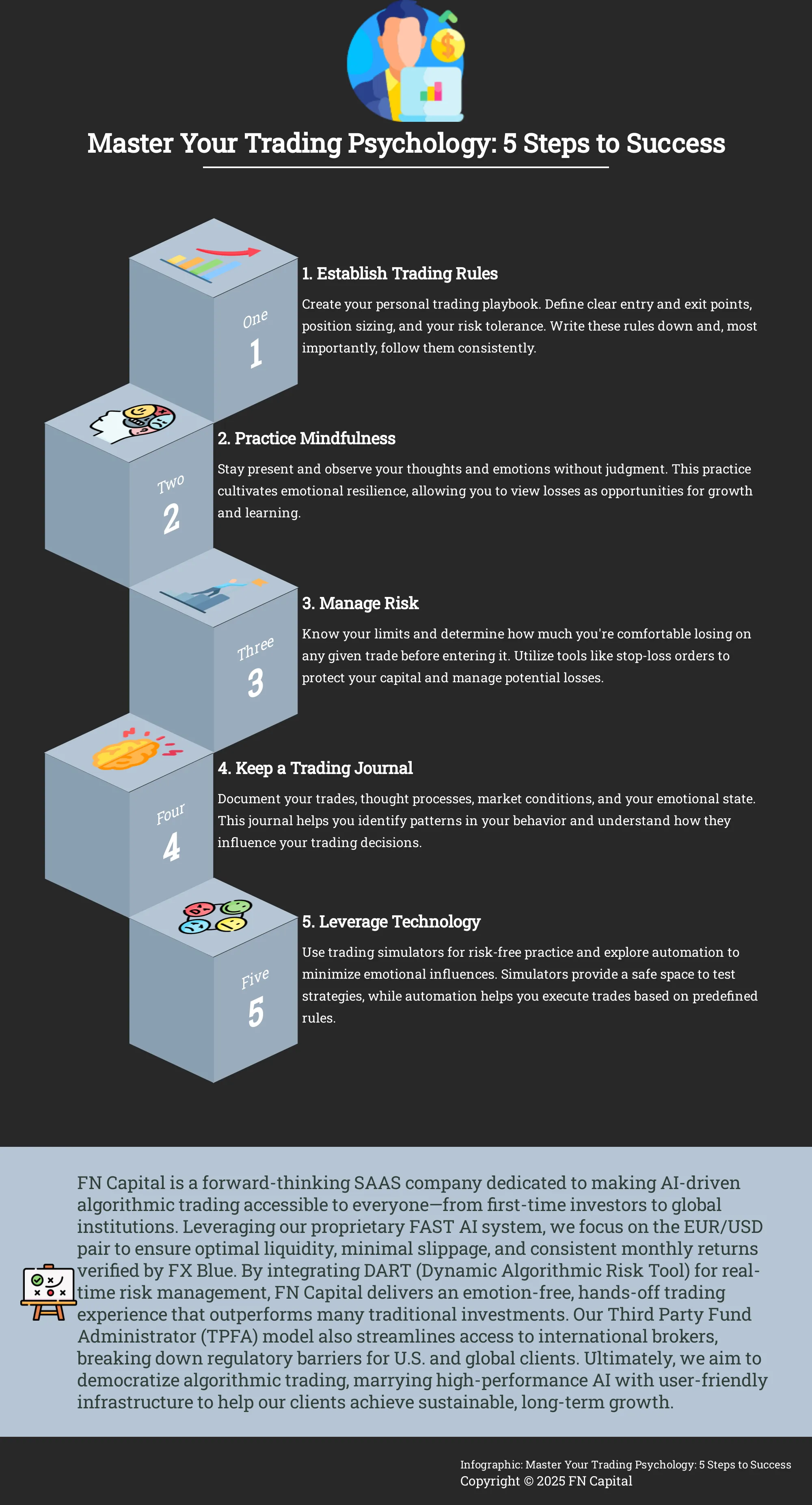Are you ready to transform your trading performance? The key to consistent profits lies not just in technical analysis, but in mastering the psychology of trading. This in-depth guide explores the emotional rollercoaster traders face, from the fear of loss to the allure of greed. We’ll delve into common psychological traps, such as analysis paralysis and revenge trading, and provide actionable strategies to build a winning mindset. This exploration of trading psychology for consistent profits covers everything from setting realistic expectations and practicing discipline to using technology to automate your trading and reduce emotional bias. Get ready to take control of your emotions and achieve sustainable success in the markets.
Key Takeaways
- Manage your emotions: Successful trading requires mastering your mindset. Develop the discipline and patience to follow your plan, even when markets get volatile.
- Analyze your trades: Regularly review your trading journal, not just for wins and losses, but to understand the “why” behind each decision. Identify patterns and adjust your strategies to avoid repeating mistakes.
- Leverage technology: Use simulators for risk-free practice and explore automation to reduce emotional bias in your trading. Technology can be a powerful tool for improving your trading psychology.
What is Trading Psychology?
What is Trading Psychology?
Trading psychology explores how our emotions and mental state influence trading decisions. It’s a critical factor impacting performance and success, sometimes even more so than market knowledge or a sophisticated trading plan. If fear or greed takes over, you might abandon your plan at the worst possible moment, leading to impulsive trades and inconsistent profits. Understanding trading psychology is about recognizing these emotional influences and developing strategies to manage them. This allows you to make rational decisions based on your analysis and predefined plan, even when markets get turbulent. Markets.com offers helpful information on developing a trader’s mindset.
Developing strong trading psychology is a continuous process of self-awareness, discipline, and adapting to market dynamics. It’s about building the mental resilience to stick to your plan, manage risk, and achieve consistent long-term results. Resources like those available at Wall Street Mojo offer valuable insights into the core concepts of trading psychology. By understanding how your mind works in the trading environment, you can take control of your decisions and improve your chances of success. The Knowledge Academy highlights how honing your trading psychology, alongside market analysis skills, is key to becoming a more confident and profitable trader. Recognizing the influence of emotions on your trading decisions, as discussed in this Medium article, is the first step toward mastering the psychological aspects of trading.
Trading can feel like a thrilling ride, but it’s not always smooth sailing. Even seasoned traders grapple with emotions that can sabotage their best-laid plans. Understanding these emotional pitfalls is the first step toward navigating the markets with greater control and consistency.
Fear: Trading’s Biggest Roadblock
The Emotional Rollercoaster of Trading
Trading can feel like a thrilling ride, but it’s not always smooth sailing. Even seasoned traders grapple with emotions that can sabotage their best-laid plans. Understanding these emotional pitfalls is the first step toward navigating the markets with greater control and consistency.
Fear: Trading’s Biggest Roadblock
Fear is a primal instinct, and in trading, it often manifests as the fear of losing money. This fear can be paralyzing, causing you to hesitate when you should act or exit a profitable trade prematurely. Imagine seeing a promising opportunity but being too afraid to take the risk, only to watch it skyrocket without you. Or, picture yourself in a winning position, but fear whispers doubts, prompting you to sell too soon, missing out on greater gains. Recognizing fear and developing strategies to manage it is crucial for long-term success. For further insights into overcoming fear in trading, explore resources on managing trading psychology.
Greed: The Profit Thief
On the flip side of fear is greed—the insatiable desire for more. While ambition is important, unchecked greed can lead to impulsive decisions and excessive risk-taking. It’s the voice that urges you to hold onto a losing trade for too long, hoping it will magically rebound, or to double down on a winning position, risking a significant portion of your profits. Greed clouds judgment, pushing you to chase unrealistic returns and ultimately jeopardizing your overall trading goals. Learn more about controlling emotions for profitable trades.
Overconfidence: A Recipe for Disaster
After a string of wins, it’s easy to fall into the trap of overconfidence. You might start to believe you’ve cracked the code to the market, that your intuition is infallible. This inflated sense of self-assurance can lead to neglecting risk management and taking on positions that are too large for your account size. Overconfidence can blind you to potential market shifts and make you less adaptable to changing conditions. Remember, even the most experienced traders experience losses. Humility and continuous learning are essential for navigating the unpredictable nature of the markets. For a deeper understanding of trader mindset, explore resources on trading psychology.
Ever find yourself endlessly researching, second-guessing every indicator, and ultimately failing to pull the trigger on a trade? That’s analysis paralysis, and it stems from the fear of making a wrong move. This often leads to decision fatigue, where the sheer volume of information overwhelms your ability to make any decision at all. You might start with unrealistic optimism, only to become bogged down by fear and indecision. Remember, perfect information doesn’t exist in trading. A good decision made now is often better than a perfect decision made too late.
FOMO and Impulsive Trades
Fear of missing out (FOMO) is a powerful emotion that can drive impulsive trades. Seeing others profit from a sudden market move can tempt you to jump in without a plan, often at the worst possible time. This is closely related to herd mentality, where traders blindly follow the crowd, ignoring their own analysis and risk tolerance. Impulsive trades rarely end well. Stick to your strategy and avoid getting swept up in market hype.
Revenge Trading: Don’t Do It
Common Psychological Traps
Even seasoned traders fall prey to psychological traps. Understanding these pitfalls is the first step to overcoming them and making sound trading decisions.
Analysis Paralysis and Decision Fatigue
Ever find yourself endlessly researching, second-guessing every indicator, and ultimately failing to pull the trigger on a trade? That’s analysis paralysis, and it stems from the fear of making a wrong move. This often leads to decision fatigue, where the sheer volume of information overwhelms your ability to make any decision at all. You might start with unrealistic optimism, only to become bogged down by fear and indecision. Remember, perfect information doesn’t exist in trading. A good decision made now is often better than a perfect decision made too late.
FOMO and Impulsive Trades
Fear of missing out (FOMO) is a powerful emotion that can drive impulsive trades. Seeing others profit from a sudden market move can tempt you to jump in without a plan, often at the worst possible time. This is closely related to herd mentality, where traders blindly follow the crowd, ignoring their own analysis and risk tolerance. Impulsive trades rarely end well. Stick to your strategy and avoid getting swept up in market hype.
Revenge Trading: Don’t Do It
Losses are inevitable in trading. However, how you react to those losses defines your long-term success. Revenge trading, the urge to recoup losses quickly by taking bigger risks, is a dangerous path. It’s driven by frustration and a refusal to accept the initial loss. This emotional reaction can lead to a spiral of bad decisions and even greater losses. Accept losses as part of the game, learn from them, and move on.
Think of trading rules as your personal playbook. They help you avoid impulsive decisions driven by emotions like fear or greed. Your rules should outline your entry and exit points, position sizing, and risk tolerance. Write them down and, most importantly, stick to them. Following a well-defined trading strategy keeps you disciplined and consistent, leading to better trading outcomes. This structured approach helps you navigate the complexities of the market with a clear head.
Mindfulness for Traders
Mindfulness is more than just a buzzword; it’s a powerful tool for traders. It’s about being present in the moment, observing your thoughts and emotions without judgment. Mindfulness fosters emotional resilience, helping you view losses not as failures, but as opportunities for growth. This shift in perspective can significantly impact your trading performance. Cultivating self-awareness through mindfulness lets you identify and address emotional biases that might be hindering your decision-making.
Risk Management: Your Safety Net
Practical Strategies to Improve Your Trading Psychology
Ready to take control of your emotions and make smarter trading decisions? Here are a few practical strategies you can implement right away:

Define and Follow Trading Rules
Think of trading rules as your personal playbook. They help you avoid impulsive decisions driven by emotions like fear or greed. Your rules should outline your entry and exit points, position sizing, and risk tolerance. Write them down and, most importantly, stick to them. Following a well-defined trading strategy keeps you disciplined and consistent, leading to better trading outcomes. This structured approach helps you navigate the complexities of the market with a clear head.
Mindfulness for Traders
Mindfulness is more than just a buzzword; it’s a powerful tool for traders. It’s about being present in the moment, observing your thoughts and emotions without judgment. Mindfulness fosters emotional resilience, helping you view losses not as failures, but as opportunities for growth. This shift in perspective can significantly impact your trading performance. Cultivating self-awareness through mindfulness lets you identify and address emotional biases that might be hindering your decision-making.
Risk Management: Your Safety Net
Effective risk management is crucial for both your portfolio and your mindset. Determine how much you’re truly comfortable losing on any given trade. Fully accept the possibility of loss before entering a trade. Techniques like stop-loss orders can help mitigate emotional biases and protect against significant losses. This creates a psychological safety net, allowing you to trade with more confidence and clarity. Remember, preserving your capital is just as important as making profits, and sound risk management practices are essential for long-term success.
A growth mindset is essential for long-term success in trading. It means believing that your abilities and skills can be developed through dedication and hard work. Embrace challenges as opportunities to learn and grow. Self-reflection is key to identifying areas for improvement. Continuously seek knowledge and refine your skills. Whether it’s learning a new technical indicator or improving your understanding of market dynamics, the pursuit of knowledge is a continuous process. Combine this with a focus on effective market analysis, and you’ll be well-equipped to handle the challenges of the market and achieve your trading goals.
Reflect on Your Trading
Honest self-reflection is key to improving your trading. It’s easy to get caught up in the excitement of a win or the frustration of a loss, but taking a step back to analyze your decisions is essential for long-term success. Think of it as reviewing your trades—a chance to see what you aced and where you can improve.
Keep a Trading Journal
Reflect on Your Trading
Honest self-reflection is key to improving your trading. It’s easy to get caught up in the excitement of a win or the frustration of a loss, but taking a step back to analyze your decisions is essential for long-term success. Think of it as reviewing your trades—a chance to see what you aced and where you can improve.
Keep a Trading Journal
A trading journal is more than just a record of your wins and losses. It’s a space to document your thought processes, the market conditions at the time of your trade, and even your emotional state. Were you feeling anxious, greedy, or overly confident? Noting these factors can help you recognize patterns in your behavior and how they influence your trading decisions. A simple spreadsheet or even a notebook can work—the key is to be consistent and detailed in your entries.
Analyze Past Trades
Once you have a record of your trades, take the time to review them objectively. Don’t just focus on the outcome—a winning trade doesn’t always mean a good decision, and a losing trade isn’t always a bad one. Practicing mindfulness can be a powerful tool. Try to understand the why behind each trade. Did you follow your trading plan? Did you let emotions cloud your judgment? By analyzing your past trades, you can start to identify your strengths and weaknesses as a trader.
Break Harmful Patterns
We all have tendencies that can sabotage our trading. Maybe you hold onto losing trades for too long, hoping they’ll turn around. Or perhaps you jump into trades without proper analysis, fueled by the fear of missing out. Recognizing these patterns is the first step to breaking free from them. Developing a solid trading strategy and sticking to it can help you avoid impulsive decisions driven by fear or greed. Consider seeking different perspectives on your trades to challenge your biases and make more rational choices. Treat each trade as a business decision, not a gamble, and you’ll be well on your way to more consistent results.
Before you even place a trade, take time to define your trading objectives. What do you want to achieve in the markets? Are you aiming for a specific monthly return? Do you want to master a particular trading strategy? Having clear goals provides direction and helps you stay focused on your long-term vision. As mentioned in this article on trading psychology, many traders prioritize technical analysis over the psychological aspects of trading. Define your goals, write them down, and revisit them regularly.
Review and Adjust Your Performance
Regularly reviewing your trading performance is crucial for identifying what’s working and what needs adjustment. This isn’t just about analyzing your wins and losses. It’s about understanding the why behind them. Were your wins due to sound analysis or just lucky market moves? Did your losses stem from avoidable mistakes or unforeseen events? Honest self-assessment is key. This Markets.com article highlights the importance of a winning mindset, emphasizing that losses are inevitable. Use them as learning opportunities to refine your strategies and improve your decision-making process.
Celebrate Milestones, Learn from Mistakes
Trading can be an emotional rollercoaster. It’s important to acknowledge and celebrate your wins, no matter how small. These milestones reinforce positive behaviors and keep you motivated. However, don’t let success lead to overconfidence. Remember that losses are part of the game. Losses can trigger emotional biases like revenge trading, which can quickly derail your progress. Instead, view setbacks as opportunities for growth. Practicing mindfulness can help you approach losses with a more objective and constructive perspective, turning them into valuable learning experiences. This article on trading psychology offers additional insights into managing emotions in trading.
Use Technology to Improve Trading Psychology
Technology can be a powerful ally in managing your emotions and making sound trading decisions. It offers tools and techniques to help you practice, automate, and analyze your trading behavior, ultimately leading to improved trading psychology.
Practice with Trading Simulators
Trading simulators offer a risk-free environment to test strategies and refine your skills. They allow you to experience the emotional ups and downs of trading without the pressure of real financial consequences. Practice in a simulated environment lets you develop a consistent mindset, crucial for long-term success, much like a flight simulator helps pilots before flying a real plane. Trading simulators can help traders overcome biased and irrational decisions, improving profitability and efficiency. Developing the right mindset is essential for consistent profits in the financial markets, as highlighted by Faster Capital.
Automate to Reduce Emotional Bias
One of the most significant benefits of technology in trading is automating tasks and reducing emotional bias. Automated trading systems execute trades based on predefined rules, removing impulsive decisions driven by fear or greed. This allows you to approach trading with a more mindful perspective, viewing losses as learning opportunities. Automating key aspects of your trading process creates space for clear thinking and better decision-making. This mindful approach, as discussed by Quantified Strategies, sees setbacks as opportunities for growth. Similar to the principles discussed by The Trader In You, automation frees you to focus on self-awareness, observing your thoughts and behaviors without being distracted by constant market monitoring.
Keep Improving Your Trading
Use Technology to Improve Trading Psychology
Technology can be a powerful ally in managing your emotions and making sound trading decisions. It offers tools and techniques to help you practice, automate, and analyze your trading behavior, ultimately leading to improved trading psychology.
Practice with Trading Simulators
Trading simulators offer a risk-free environment to test strategies and refine your skills. They allow you to experience the emotional ups and downs of trading without the pressure of real financial consequences. Practice in a simulated environment lets you develop a consistent mindset, crucial for long-term success, much like a flight simulator helps pilots before flying a real plane. Trading simulators can help traders overcome biased and irrational decisions, improving profitability and efficiency. Developing the right mindset is essential for consistent profits in the financial markets, as highlighted by Faster Capital.
Automate to Reduce Emotional Bias
One of the most significant benefits of technology in trading is automating tasks and reducing emotional bias. Automated trading systems execute trades based on predefined rules, removing impulsive decisions driven by fear or greed. This allows you to approach trading with a more mindful perspective, viewing losses as learning opportunities. Automating key aspects of your trading process creates space for clear thinking and better decision-making. This mindful approach, as discussed by Quantified Strategies, sees setbacks as opportunities for growth. Similar to the principles discussed by The Trader In You, automation frees you to focus on self-awareness, observing your thoughts and behaviors without being distracted by constant market monitoring.
Frequently Asked Questions
Why is trading psychology so important? Trading psychology is crucial because your emotions can significantly impact your trading decisions, sometimes even more than your market knowledge or trading plan. Mastering your emotions allows you to stick to your plan, manage risk effectively, and make rational decisions even when the market gets volatile. This ultimately leads to more consistent results.
How can I overcome fear and greed in trading? Fear and greed are common emotions in trading. To manage fear, focus on developing a robust trading plan and sticking to it. This provides a sense of control and reduces anxiety. For greed, set realistic profit targets and avoid chasing unrealistic gains. Remember, preserving your capital is just as important as making profits.
What are some common psychological traps to watch out for? Common traps include analysis paralysis (overthinking and failing to act), FOMO (fear of missing out, leading to impulsive trades), and revenge trading (trying to recoup losses quickly with risky trades). Recognizing these traps is the first step to avoiding them. Develop a clear trading plan, practice patience, and accept that losses are part of the game.
How can I improve my trading psychology? Several strategies can help: Keep a trading journal to track your emotions and decisions. Develop and follow clear trading rules. Practice mindfulness to become more aware of your emotional state. Focus on risk management to protect your capital. Analyze past trades to identify patterns and areas for improvement.
What role does technology play in improving trading psychology? Technology offers valuable tools, such as trading simulators for risk-free practice and automated trading systems to reduce emotional bias. Simulators allow you to experience market fluctuations without risking real money, while automation removes impulsive decisions from the equation. These tools can help you develop a more disciplined and consistent approach to trading.
Frequently Asked Questions
Why is trading psychology so important? Trading psychology is crucial because your emotions can significantly impact your trading decisions, sometimes even more than your market knowledge or trading plan. Mastering your emotions allows you to stick to your plan, manage risk effectively, and make rational decisions even when the market gets volatile. This ultimately leads to more consistent results.
How can I overcome fear and greed in trading? Fear and greed are common emotions in trading. To manage fear, focus on developing a robust trading plan and sticking to it. This provides a sense of control and reduces anxiety. For greed, set realistic profit targets and avoid chasing unrealistic gains. Remember, preserving your capital is just as important as making profits.
What are some common psychological traps to watch out for? Common traps include analysis paralysis (overthinking and failing to act), FOMO (fear of missing out, leading to impulsive trades), and revenge trading (trying to recoup losses quickly with risky trades). Recognizing these traps is the first step to avoiding them. Develop a clear trading plan, practice patience, and accept that losses are part of the game.
How can I improve my trading psychology? Several strategies can help: Keep a trading journal to track your emotions and decisions. Develop and follow clear trading rules. Practice mindfulness to become more aware of your emotional state. Focus on risk management to protect your capital. Analyze past trades to identify patterns and areas for improvement.
What role does technology play in improving trading psychology? Technology offers valuable tools, such as trading simulators for risk-free practice and automated trading systems to reduce emotional bias. Simulators allow you to experience market fluctuations without risking real money, while automation removes impulsive decisions from the equation. These tools can help you develop a more disciplined and consistent approach to trading.





